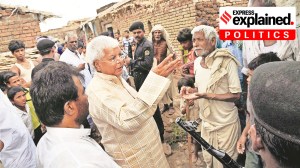When Yeltsin came a-visiting
January 28, 1993: Russian President Boris Yeltsin and Prime Minister Narasimha Rao broke the deadlock in bilateral ties on Thursday by res...

January 28, 1993: Russian President Boris Yeltsin and Prime Minister Narasimha Rao broke the deadlock in bilateral ties on Thursday by resolving outstanding differences on several issues, including the vexed rupee-rouble exchange rate and the supply of Russian military spares to India.
Mr Yeltsin also reaffirmed his determination to go ahead with the controversial cryogenic engine deal. Without referring to it by name, the Russian leader asserted that his country would fulfill the former Soviet Union’s contractual obligations in the space cooperation programme, and gave a categoric assurance that it would not go back on the commitment because of “third party interference” an obvious reference to US pressures.
These decisions, announced at the end of two-and-a-half hours of discussions between Mr Yeltsin and Mr Rao on Thursday morning, will pave the way for the two countries to pick up the threads and establish a new equation in keeping with the realities and demands of a post-Cold War world. As Mr Rao himself told Mr Yeltsin, the visit marked “the beginning of a new era in Indo-Russian relations”.
Briefing correspondents on the outcome of the talks, the External Affairs Ministry spokesman said the two countries had settled on the exchange rate existing on January 1, 1990, to calculate the debt owed by India to Russia and the package would be implemented from April 1992, repayable over 45 years. This would give India a net advantage of 32 per cent, he said.
The main gain for India, however, has been Mr Yeltsin’s three-point formula for ensuring the smooth supply of defence spares, which came as a direct outcome of the agreement on the outstanding debt. The three proposals he made were: improvement in the functioning of the relevant manufacturing concerns in Russia, joint ventures, either in India or in Russia, to produce the required spare parts, and the transfer of technology to India for indigenous production.
In the evening, the two sides signed nine agreements covering different aspects of bilateral cooperation envisaged, including defence, science and technology, culture, narcotics, smuggling, trade and internal security. the Treaty of Friendship and cooperation, which replaces the old Indo-Soviet Friendship Treaty without the vital security clause, was also signed, laying down the framework for the future relationship.
The agreement on the rupee-rouble exchange rate is expected to be signed on Friday as officials from both sides were still working out the details, the spokesman said.
In his discussions with the Prime Minister, Mr Yeltsin stressed the need to give a substantial thrust to bilateral trade, pointing out that the current levels do not reflect the potential of commercial ties between the two countries. Both leaders agreed to make every effort possible to promote trade.
Mr Yeltsin and Mr Rao first met with select aides. The meeting lasted about an hour and 45 minutes. This was followed by a meeting with the full delegation from both sides.
The two leaders described their agreement on the rupee-rouble exchange rate issue as a “decisive forthright political agreement” which would remove an “unnecessary irritant in bilateral relations”….
Excerpted from an Express News Service’ report in The Indian Express’, January 29, 1993



- 01
- 02
- 03
- 04
- 05




























